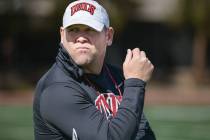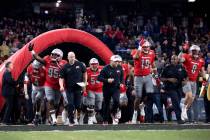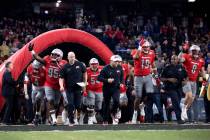Mountain West makes compelling case for two-year BCS waiver
The Mountain West Conference has taken its case public for a two-year waiver for automatic Bowl Championship Series status, and the league's arguments appear to be compelling.
The conference backs up its statements with facts that not only boost the Mountain West but make the Atlantic Coast Conference and especially the Big East appear less deserving.
But the Mountain West is dealing with more than facts and compelling arguments in trying to convince the BCS Presidential Oversight Committee that the league deserves the waiver for the 2012 and 2013 seasons.
"It's hard to say, because it's such a secretive and vague process," Sports Illustrated college football writer Stewart Mandel said. "It isn't like you hit certain marks and you're in. You hit the marks, and you have a chance to ask for a waiver."
The Review-Journal sent emails requesting comments from all 12 committee members, and only New Mexico president David Schmidly -- the Mountain West's representative -- agreed to talk. No one else even provided clues as to how they might vote.
"It's obviously a long shot, but it's worth a shot," UNLV athletic director Jim Livengood said. "We have to do it. Do I think we deserve it? Absolutely. Do we compare favorably to what the Big East has done? Absolutely."
The presidents are expected to meet in January, and they will have more than the Mountain West's argument on the numbers to consider. The future of automatic qualification (AQ) status is in doubt, and conference movement will leave the Mountain West in much different shape in 2013, when Boise State and San Diego State enter the Big East.
Another complication is the Mountain West's expected merger with Conference USA in 2013.
Next season, though, the league will be mostly intact, with only Texas Christian leaving to join the Big 12 Conference. The Mountain West also will add Fresno State, Hawaii and UNR.
Though the Mountain West argues the criteria for a waiver is supposed to be based on the past, such decisions by the committee -- well aware of the changes the conference will experience -- probably aren't made in a vacuum.
"They're asking to be judged on the merit of teams they won't have," Mandel said. "It's hard to justify with the future of the conference being so uncertain right now."
Perhaps one strategy would be for the Mountain West to ask for a one-year waiver, for the 2012 season, to better gauge where the conference will stand.
"That might be a selling point," Livengood said.
For now, though, the MWC is seeking a two-year waiver, which would provide a windfall. If approved, the conference could receive more than $20 million each year. The conference took in $12.75 million after the 2010 season, when TCU represented the league in the Rose Bowl.
The BCS uses three standards to evaluate conferences, and the Mountain West surpassed the minimum in two categories in the recently concluded four-year evaluation period. The MWC was in the top six (fourth) for average ranking of its highest-ranked team and finished above 50 percent (60.2) in adjusted Top 25 performance -- the number of ranked teams compared with the number of schools in the league.
In the one area the conference fell short, the Mountain West was seventh in average conference ranking.
The Mountain West proposal pointed out the Big East previously posted similar numbers, but was allowed to keep its AQ status. And the MWC makes the point the Big East and ACC also failed to measure up in this evaluation period.
To further prove its case, the Mountain West document stated that television ratings and attendance numbers for conference schools in BCS games were competitive compared with AQ leagues.
"I feel we have a good case based on performance and based on precedent," Schmidly said. "The Big East was granted extensions for a total of 10 years, and in each instance the performance was better in the Mountain West. We've got to get nine votes, and we'll see how it goes."
This is Schmidly's first year serving on the committee, so the only chance he had to get a read on his fellow members was during one in-season meeting.
He doesn't know what to expect when they convene again.
"I have to follow it and see how it takes shape," Schmidly said. "My responsibility is to put the best case forward for the Mountain West with the commissioner."
Conference commissioner Craig Thompson referred questions to deputy commissioner Bret Gilliland, who was instrumental in drafting the Mountain West's proposal.
"I would certainly hope the determination would be made based on the merits of the exemption request and that the committee would act in a manner consistent with prior precedent," Gilliland wrote in an email.
But the Mountain West knows the decision will rest on more than just facts.
That's why it went public with this document, posting it prominently on the front page of its website and notifying the media of its existence.
Contact reporter Mark Anderson at manderson@reviewjournal.com or 702-387-2914. Follow him on Twitter: @markanderson65.























